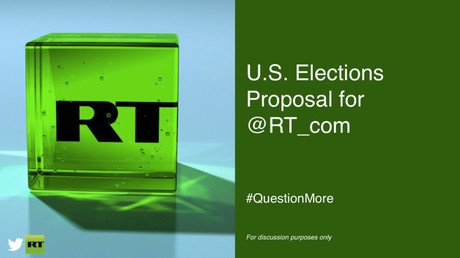Look harder: US rebukes British general for doubting heightened threat from Iran
A UK military commander was rebuked by the US Central Command for questioning Washington’s claims that Iran poses an increased threat. Gen. Ghika, a senior figure in the anti-ISIS coalition, said none was evident in Iraq or Syria.
The awkward exchange on Tuesday came as the US is trying to rally its allies to confront Tehran over an unspecified threat to American interests in the Middle East.
Despite the beat of the war drum, even the US’ closest allies remain skeptical about the narrative furthered by Iran hawks in Washington like US National Security Advisor John Bolton and US Secretary of State Mike Pompeo. One of the doubters is British Army Maj. Gen. Christopher Ghika, a deputy head of the US-led coalition created to fight the terrorist group Islamic State (IS, formerly ISIS).
"No. There's been no increased threats from ... etc"British general Combined Joint Task Force #OIR May 14#Iraq#Iran#Syria Christopher Ghika pic.twitter.com/5sg4AFfsMO
— M27 (@M27Unchained) May 14, 2019
“There’s been no increased threat from Iranian-backed forces in Iraq and Syria,” Gen. Ghika said on Tuesday during a video briefing from Iraq. “We’re aware of that presence, clearly. And we monitor them along with a whole range of others because that’s the environment we’re in.”
There is a large number of Shia militias operating in Iraq and Syria, some with the backing of the Iranian government. They were involved in fighting against radical Sunni groups, including IS, in the past few years, but the degree of control that Tehran has over the fighters is questionable.
Washington cited the existence of those groups as one of the reasons why Iran poses a danger to the US and should be contained. The US has some 5,000 troops deployed in Iraq with the consent of its government as part of the coalition effort, as well as some 2,000 troops stationed in Syria illegally.
Also on rt.com NATO ally Spain pulls warship from US strike group ‘to avoid being dragged into conflict with Iran’Hours after Ghika’s report, the US Central Command, which is responsible for the Middle East operations, rebuked the British general, saying his word ran “counter to the identified credible threats available to intelligence from US and allies regarding Iranian backed forces in the region.” CENTCOM said it has “increased the force posture level for all service members” of the anti-IS coalition.
Ghika said during the video call, however, that Operation Inherent Resolve, as the coalition effort is officially called, is not operating against Iran, so he was speaking only about the militias. “I’m not going to go into the detail of it, but there are a substantial number of militia groups in Iraq and Syria and we don’t see any increased threat from many of them at this stage.”
Also on rt.com ‘There won’t be any war’ between Iran & US – KhameneiCENTCOM’s current position seems to contradict what they told the Pentagon’s Office of the Inspector General. The latest OIG quarterly report on Operation Inherent Resolve said the command believed Tehran-backed militias to be focused on assisting the Syrian government in the fight against IS and not intent on attacking the coalition forces. The report warned that this may change, should the US ramp up what Tehran could see as “anti-Iranian activities.”
Earlier, the US deployed an aircraft carrier strike group, several B-52 Stratofortress strategic bombers, an amphibious transport dock, and a battery of Patriot air defense missiles in response to the unspecified threat from Iran.
The Pentagon may also send as many as 120,000 troops to the Middle East, according to a New York Times report. President Trump has rejected the claim, calling it fake news and saying: “If we did that, we would send a hell of a lot more troops than that.”
Like this story? Share it with a friend!














